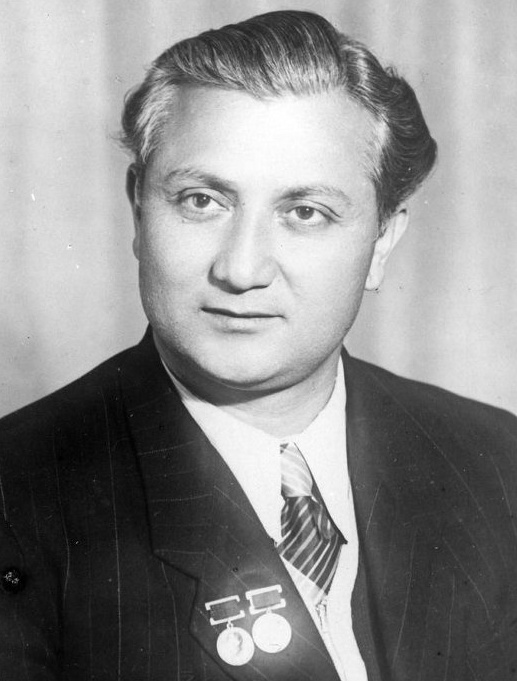
MUKHTAR ASHRAFI
(1912-1975)
People’s artist of Uzbekistan, winner of the Nazareth and Nehru International Awards, Republican state Prize, composer, conductor, teacher, senior public figure Mukhtar Ashrafi made a huge contribution to the development of music culture of Uzbekistan in the 20th century. His works in the genres of opera, musical drama, ballet, symphonic, vocal-symphonic chamber-instrument, song and romance left a deep mark on the history of modern Uzbek music.
M.Ashrafi was born on June 11, 1912 in Bukhara in an artistic family. Since childhood, he was interested in music and at the age of 12 he entered the Oriental music school founded by Abdurauf Fitrat, learning from the Maqam teachers. He entered the Uzbek Institute of music and choreography, which opened in the city of Samarkand in 1928, among the first. As a student, M.Ashrafi recorded Bukharan folk songs, T.Sadigov sang Fargona Valley songs and Sh.Ramazonov notes Khwarezmian folk songs. Head of the Institute N.Under Mironov’s edit, it goes out of print in 1931 under the title “Pesni Fergani, Bukhari I Khivi:”. After graduating from the Institute, M.Ashrafi worked in the role of artistic director and chief conductor at the Uzbek state musical theater in 1931-34. In 1934-37, professor S. at the Uzbek opera Studio, founded in Koshy, Moscow State Conservatory.N.He learns from Vasilenko. M. in 1937 in Moscow at the age of ten days of Uzbek literature and art.Ashrafiy actively participated as a conductor and music leader and was awarded the honorary title of “Honored artist of Uzbekistan” in the same year.
M.Ashrafi showed active organization in various leadership positions. Since 1938, he also holds the position of artistic director and chief conductor of the Republican State Opera and Ballet Theater, and from 1943 – 47-director. Rector of the Tashkent State Conservatory and head of the Department of opera and Symphony conducting in 1947-61, director, artistic director and chief conductor of the newly formed Samarkand opera and Ballet Theater in 1964-66, artistic director and chief conductor of the academic Grand opera and Ballet Theater named after Alisher Navoi in 1966-71, artistic director and chief conductor of the Tashkent State Conservatory
Through his conducting career, M. For many years, Ashrafi promoted opera, Ballet and symphonic works by Uzbek, European and Russian classical composers.
In 1939, playwright K.The first Uzbek opera, “The Storm”, based on a libretto by Yashin, was performed by S.N.Created in collaboration with Vasilenko. A second opera, “The Grand Canal”, was written by these authors in early 1941. Based on Nawai’s 1958 epic “Sab’ai the Wanderer”, K.Yashin and M.To a libretto by the muhamedovs, the Opera “Dilorom” was composed by M.Ashrafi wrote independently. In 1962, in dedication to Furqat siymasi, I.The Sultan created an opera based on his libretto, “the heart of the poet”. M. The music author of the ballets in Ashrafi’s song: “Amulet of love” (G.Libretto by Miller, 1969.), “Temurmalik” (M.Libretto by Ashrafi, 1970.), “Perseverance” (A.M.Camel libretto, 1971.). The premiere of this ballet took place in the capital of the Egyptian State-The Opera and Ballet Theater of the city of Cairo — in 1972, and was attended by J.Awarded the Nazarene Prize in 1973; “love and sword” (M.Ashrafiy and G.Libretto by Gelovani, 1973.) In Dushanbe and Tashkent, where it premiered in 1973-74.
Composer M.Ashrafi also made an effective contribution to the development of the art of symphonic music in our republic. The 1932 “building” March for Symphony Orchestra was in the European classical symphony style, creating the 1942 “heroic” Symphony. A Tajik dance suite was also composed in the same style in 1952. M.Author of symphonic works in Ashrafi koi: three symphonic syuita in the 1950s, poet S. in 1963.The symphonic poem-Rhapsody “Temurmalik”, dedicated to the memory of Ayniy, was written in the 1964 uvetyur of the “festive delights”.
Of the vocal-symphonic works of the major genre, the cantata” Song Of Happiness “in 1951, the vocal-symphonic poem” terrible works “and the epic-oratorio”epic about Rustam “based on the Firdavsiyniig” masterpiece ” in 1974 (L.Sherali word) was born. In 1968, he wrote the symphonic-choreographic landscape “Subhi damda”.
M.Ashrafi is the music author of the following feature films: “born in Thunder” (1965), “the secret of Koniyuta cave” (1965), the film-opera “Dilorom” (1968), “The Legend of the ancient fortress” (1970), “Semurg'” (1972), “dawn on the Ganges river” (1972). Over the years, M.Ashrafiy composed songs, songs and romances in various genres to various solo instruments, ensembles with major musical works. M. For outstanding services in the development of music culture in 20th century Uzbekistan.Ashrafi was a distinguished artist (1937 -.), Honorary titles” people’s artist of Uzbekistan “(1934-y), order of Fame 1937, State Prize twice (1943 and 1952-y.), Republican state prize named after Hamza (1970-y), J.Nehru Indian state award, (1972-y) and winner of the 1973 Jamol Ablul Nasir Egyptian state award.
